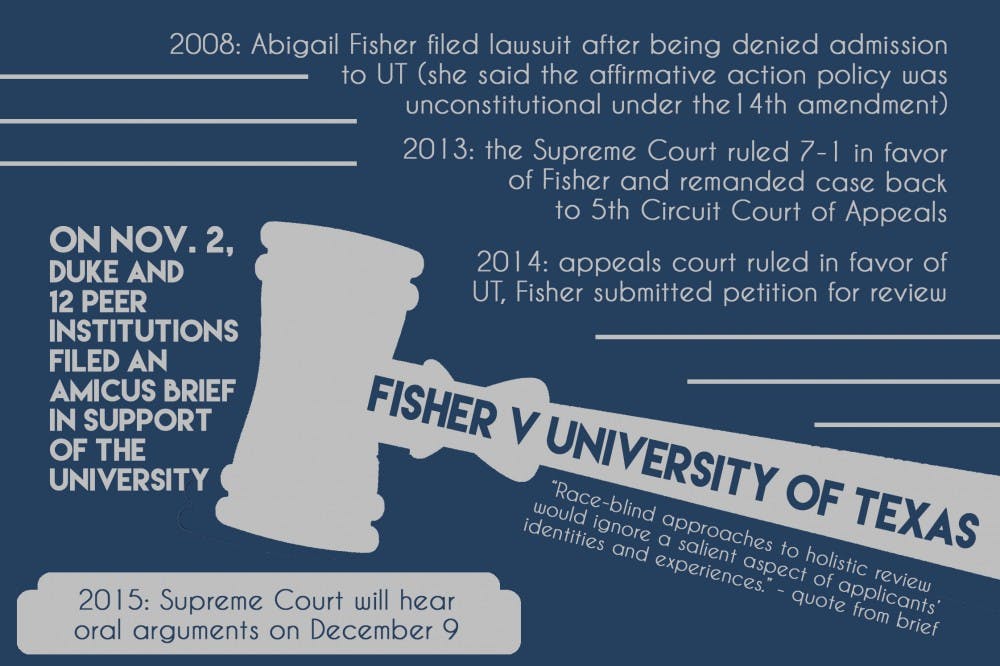Last month, Duke and several peer institutions filed an amicus curiae brief with the Supreme Court regarding the affirmative action case of Fisher v. University of Texas. Arguments for the case are set to begin Wednesday.
In 2008, a white woman named Abigail Fisher was denied admission to the University of Texas at Austin. In the state of Texas, public universities are required to admit all in-state students who graduate in the top 10 percent of their class, according to Oyez, a website dedicated to compiling Supreme Court cases and sponsored by the Chicago-Kent College of Law. Fisher was not in the top 10 percent of her class and was thus subject to holistic review, which included race. Fisher asserted that the school’s consideration of race undermined her chances of being admitted and was thus unconstitutional discrimination under the Fourteenth Amendment.
Duke, along with 12 peer institutions—Brown University, University of Chicago, Columbia University, Cornell University, Dartmouth College, Johns Hopkins University, Massachusetts Institute Of Technology, University Of Pennsylvania, Princeton University, Stanford University, Vanderbilt University and Yale University—filed a “friend of the court” brief Nov. 2 in support of the University of Texas.
“The holistic review of applications, with consideration of race and ethnicity among many other factors, is a narrowly tailored approach to achieve the compelling interest of diversity in higher education,” the brief—co-represented by Pamela Bernard, vice president and general counsel for Duke—asserts.
In the jointly-filed brief, Duke and its peer institutions wrote that prohibiting the consideration of race could lead to inaccurate judgments of qualified applicants.
“Race-blind approaches to holistic review would ignore a salient aspect of applicants’ identities and experiences—disregarding characteristics that, to some applicants, may have played a central role in shaping their goals and achievements,” the brief states.
Fisher v. University of Texas was first argued before the Supreme Court in 2012. Although Duke and a number of other universities also filed an amicus brief at that time supporting the University of Texas, the Court decided 7-1 to remand the case back to the Fifth Circuit Court of Appeals. In the majority opinion, Justice Anthony Kennedy wrote that there are benefits of diversity in education, but that the Court of Appeals had failed to apply the right standard when reviewing the case. The appeals court again ruled in favor of the University of Texas, and Fisher subsequently submitted a petition to review the decision. The Supreme Court agreed to hear the case again during the 2015-16 term and is scheduled to hear oral arguments Dec. 9.
Referring to previous affirmative action cases such as Grutter v. Bollinger and Regents of the University of California v. Bakke, the brief discussed the importance of diversity in preparing students for an increasingly multicultural world.
”When a university considers which applicants will best contribute to a vibrant learning environment intended to prepare students to live and work in a world in which race remains a salient social factor, it should not ignore the communities from which its students come and into which its students will graduate, whether it be a single state, the nation or the world,” the brief notes.
Michael Schoenfeld, vice president for public affairs and government relations, said that Duke forms its institutional opinions on controversial issues like this on a case-by-case basis. He noted, however, that the University’s stance on this particular issue has not changed.
“Admission to Duke is a complex and very nuanced process,” he said. “The fact that we have 32 to 33,000 applicants for 1,700 spots means that most people who apply to Duke are going to be disappointed. The issues raised in the amicus brief represent one part of a very complex decision-making process.”

